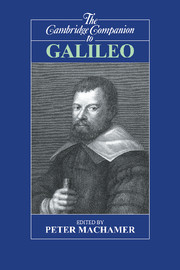Book contents
- Frontmatter
- Introduction
- 1 Galileo's Pisan studies in science and philosophy
- 2 Galileo's machines, his mathematics, and his experiments
- 3 The use and abuse of mathematical entities
- 4 Inertial problems in Galileo's preinertial framework
- 5 From Galileo to Augustine
- 6 Galileo's Copernicanism
- 7 Galileo's discoveries with the telescope and their evidence for the Copernican theory
- 8 Galileo on science and Scripture
- 9 Could there be another Galileo case?
- 10 The god of theologians and the god of astronomers
- 11 The never-ending Galileo story
- 12 The sepulchers of Galileo
- Bibliography
- Index
1 - Galileo's Pisan studies in science and philosophy
Published online by Cambridge University Press: 28 May 2006
- Frontmatter
- Introduction
- 1 Galileo's Pisan studies in science and philosophy
- 2 Galileo's machines, his mathematics, and his experiments
- 3 The use and abuse of mathematical entities
- 4 Inertial problems in Galileo's preinertial framework
- 5 From Galileo to Augustine
- 6 Galileo's Copernicanism
- 7 Galileo's discoveries with the telescope and their evidence for the Copernican theory
- 8 Galileo on science and Scripture
- 9 Could there be another Galileo case?
- 10 The god of theologians and the god of astronomers
- 11 The never-ending Galileo story
- 12 The sepulchers of Galileo
- Bibliography
- Index
Summary
The aura surrounding Galileo as founder of modern science disposes many of those writing about him to start in medias res with an account of his discoveries with the telescope, or with his dialogues on the world systems and the two new sciences, or with the trial and the tragic events surrounding it. Frequently implicit in such beginnings is the attitude that Galileo had no forebears and stands apart from history, this despite the fact that he was forty-six years of age when he wrote his Sidereus Nuncius and then in his late sixties and early seventies when he composed his two other masterpieces.
Attempts have recently been made by scholars to dispel this myth by giving closer scrutiny to the historical record – closer, that is, than one gets from perusing the National Edition of Galileo's works. This was a masterful collection, but begun as it was in the last decade of the nineteenth century and completed in the first decade of the twentieth, it perforce could not benefit from the historiographical techniques developed in our century. During the past twenty years, in particular, much research has been done on Galileo's manuscripts, and it sheds unexpected light on what has come to be known as Galileo's "early period" – that covering the first forty-five years of his life.
- Type
- Chapter
- Information
- The Cambridge Companion to Galileo , pp. 27 - 52Publisher: Cambridge University PressPrint publication year: 1998
- 8
- Cited by



